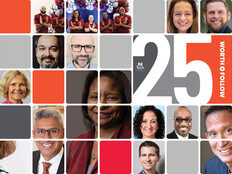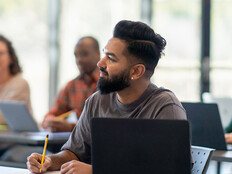Faculty Development and Digital Citizenship Top EDUCAUSE’s 2017 Teaching and Learning Issues List
Personalized, adaptive learning is the wave of the future for students, so why wouldn’t it be embraced for teaching new concepts to professors?
That was the conclusion drawn by the EDUCAUSE Learning Initiative (ELI) after discovering that faculty development was the No. 1 issue in its annual Key Issues in Teaching and Learning survey.
“The folks who are conducting faculty development are beginning to apply adult learning principles to the craft,” says Malcolm Brown, the director of ELI. “They are forming partnerships between instructional designers and faculty. They are building faculty learning communities.”
As faculty development is mirroring student learning trends in terms of collaborative group work, it is also reflecting these trends through the use of technology, says Veronica Diaz, EDUCAUSE’s director of online programs.
“There has been a lot more faculty development available that is mediated by tech,” says Diaz. “Some of the tech we have today can really help to break down barriers. It gets people connected virtually.”
In a 2016 EDUCAUSE article, authors Shelli Fowler and Mark Bond opined that as education becomes more “networked,” faculty development will need to follow suit.
“As all of us in higher education move closer to what’s on the horizon, let’s explore the power of connected learning, which brings individualized work into the open and into the networked learning communities that our technology and social media tools so easily engender,” wrote Fowler and Bond.
Digital Citizenship and Privacy Come into Focus
Though not new to the list, Digital and Information Literacies have risen from middle or lower priority to No. 3 on the list, Brown indicates.
“I can only guess it has to do with the media literacy events happening right now in the country,” says Brown. “It’s the notion that to be informed citizens we’re going to need to be careful with the things we encounter online.”
Historically, Brown says that this literacy has been on this list because universities wanted their students to accurately differentiate between good and bad sources when conducting academic research.
As digital tools have been introduced, the push for digital literacy has become a part of this issue. Giving students the skills to use digital tools effectively and appropriately in the workforce is a priority for any college or university.
“The use of technology has transformed every discipline and career, from engineers to doctors and politicians. Yet, the traditional academic experience does not prepare many students for the challenges they’ll face in these professions today,” wrote Phillip Ventimiglia and George Pullman in a 2016 EDUCAUSE article.
New to the list this year: Privacy and Security, which comes in at No. 14. Brown and Diaz agree that the push for using more data — and the possible breaches that have IT leaders on alert — are likely what brought this issue to the forefront.
“New conversations around privacy and security are going to be absolutely essential and unavoidable,” says Brown.
For a complete list of all 16 issues, visit ELI’s website.









